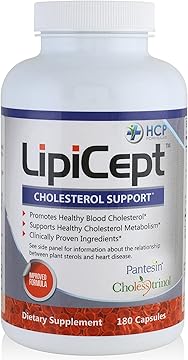- What's New?
- Why a Home Gym?
- Functional Trainers
- Longevity Training
- Fat Loss Workouts
- The Best Workout For Men
- Fat Loss For Women
- Healthy Eating
- How To Improve Your Microbiome
- Biosuperfood
- Iridesca
- Superfood
- Shilajit
- Micellar Curcumin
- Rez-V
- Beta Glucan
- P-Well
- Copper GHK
- Fibrenza
- LipiCept
- Flameout
- Igniter
- Indigo-3G
- Omega-Man
- Feral Tissue Protocol
- Pancremet
- How To Avoid Microplastics
- AirDoctor 3500
- ENVION Therapure
- Airpura R600
LipiCept Review
---------------------------------------------------------------------------------------------------------------- LipiCept ReviewMaintaining healthy cholesterol levels is a key part of supporting your cardiovascular health. HCP Formulas LipiCept is designed to offer robust cholesterol support by combining plant sterols, Cholesstrinol, and Pantesin into an effective, easy-to-take supplement. This powerful blend of natural ingredients helps lower cholesterol levels, improve cholesterol metabolism, and support overall heart health. LipiCept is packed with research-backed ingredients, including plant sterols, Sytrinol, and Pantesin, which work synergistically to support cholesterol health:
This formula doesn’t just lower cholesterol - it helps your body process it effectively for long-term health by supporting your liver, heart and cardiovascular health, too!
These additional ingredients work in harmony to support your liver's ability to process cholesterol efficiently, further boosting cardiovascular wellness and overall metabolic health. Thanks for reading our LipiCept Review. Below you'll find interesting info on cholesterol itself. Does Cholesterol in Food Matter?People worry whether eggs or other high-cholesterol foods negatively affect blood chemistry, but they're focusing on the wrong thing. Google the word "cholesterol" and most of the info you'll find is about lowering it. The most common questions? Can I eat eggs? How about shrimp and other high-cholesterol foods? Are they "safe?" Well, the amount of cholesterol in the food you eat doesn't appear to matter much at all. Your body makes cholesterol on its own, pretty much no matter what. Eat a lot of cholesterol and your body makes less. Eat less cholesterol and your body makes more. Yes, food matters in determining your cholesterol levels, but it has little to do with the amount of cholesterol in that food. Instead, cholesterol levels have to do with a couple of other issues:
Carbs and CholesterolIf someone regularly eats a lot of simple carbs, they often develop insulin resistance, leading to increased blood sugar levels. Along with this comes an increase in the rate at which fats are broken down. This leads to elevated levels of blood fats or triglycerides. You also find a decrease in good cholesterol (HDL) and an increase in bad cholesterol (LDL). This triumvirate of heart terror – high triglycerides, low HDL, and high LDL – is thought to play a big role in plaque buildup in the arteries. Too much plaque and you'll start clutching your chest at inopportune times. But you don't necessarily have to be insulin-resistant for carbs to negatively affect cholesterol levels. Just being a carb junkie and having more than about 60% of your daily calories come from carbohydrates (especially heavily processed carbs) tells the liver to start manufacturing more cholesterol. Saturated Fat and CholesterolNow it gets tricky. The cholesterol in food does matter if you eat a lot of cholesterol in combination with a lot of saturated fat. For example, most red meat contains a lot of saturated fat and a significant amount of cholesterol, so when you eat it regularly, you usually see an increase in LDL cholesterol. The good news is that the saturated-fat-laden steak also raises HDL cholesterol, so your total cholesterol to HDL ratio (a supposed marker for cardiovascular disease) isn't altered. So, in general, high-ish cholesterol foods that don't contain a lot of saturated fat like eggs and shrimp won't affect LDL cholesterol levels, but high-cholesterol, high-saturated fat foods like steaks and other cuts of red meat will. However, red meat shouldn't affect your long-term cardiovascular health because it doesn't appear to affect the LDL/HDL ratio. So, the question is, should you eat steak and hamburgers with impunity? The research is sometimes confusing. A study from 1991 found that if Americans cut the amount of saturated fat they ingested, they could delay 42,000 deaths each year… by an average of two weeks. That's not quite as bad as it sounds because "average" means that some people might have extended their life by several years while others might have extended their lives just long enough for their Hot Pockets to finish microwaving. But even so, any lengthening of lives probably had little to do with cholesterol itself. So, What Causes Heart Attacks?Doctors can't agree on what causes heart disease. Sure, there are some statistical probabilities pointing to the wisdom of lowering blood pressure and cholesterol, but they don't mean squat if you're one of the roughly 50 percent of men or 63 percent of women who die from heart attacks while not exhibiting any symptoms or strong risk factors. The only thing that doctors and scientists seem to agree on is that heart disease is a disease of inflammation. What's common to just about everyone who dies of a heart attack is a large collection of white blood cells known as macrophages. These macrophages collect around fatty deposits and secrete enzymes that digest protein. The insides of blood vessels are made of proteins, and in trying to eliminate the fatty deposits, the blood vessels are eaten away, made thinner, and made more susceptible to plaque or rupture. What surprised researchers, though, was that they also found these macrophages in presumably healthy arteries. This indicated that the inflammation was systemic and not localized. What Should I Do?Clearly, the science of cholesterol is evolving, but in the meantime, there's solid evidence to support the following:
If you are a lover of all things health and fitness, or if you'd simply love to learn more about these topics, please subscribe to Coach John's newsletter below. |

